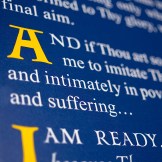 EVERAL WEEKS AGO, I posted on social media a photograph of the splendid prayer my choir says whenever we meet for rehearsal (or sing at Mass). It’s an abridged form of the “daily offering” composed by RAFAEL CARDINAL MERRY DEL VAL, who served as Secretary of State for Pope Saint Pius X. The English translation is by Monsignor Robert A. Skeris (a famous theologian and polyglot). A bunch of people contacted me, asking me how they could obtain a copy. If you earnestly desire this beautiful canvas, send an email to jeff@ccwatershed.org with the words “Cardinal Merry Del Val” in the subject line. I’ll reply to your email, explaining how it can be purchased.
EVERAL WEEKS AGO, I posted on social media a photograph of the splendid prayer my choir says whenever we meet for rehearsal (or sing at Mass). It’s an abridged form of the “daily offering” composed by RAFAEL CARDINAL MERRY DEL VAL, who served as Secretary of State for Pope Saint Pius X. The English translation is by Monsignor Robert A. Skeris (a famous theologian and polyglot). A bunch of people contacted me, asking me how they could obtain a copy. If you earnestly desire this beautiful canvas, send an email to jeff@ccwatershed.org with the words “Cardinal Merry Del Val” in the subject line. I’ll reply to your email, explaining how it can be purchased.
He Composed Music • RAFAEL CARDINAL MERRY DEL VAL was a musician & composer. Indeed, several of his compositions are still sung at the Vatican. Believe it or not, he was made a MONSIGNOR while still a seminarian.
![]()
Update: (26 October 2024) • Someone who ordered a copy from us writes as follows: “I just picked mine up last night and my oh my is it great! Thank you so much! Please consider doing things like this again in the future. I will wholeheartedly support it!”
Fun Fact • If memory serves, Cardinal Merry Del Val was born into a royal family. I don’t know anyone with a longer name. His full name is: Rafael María José Pedro Francisco Borja Domingo Gerardo de la Santísima Trinidad Merry del Val y Zulueta.

![]()




